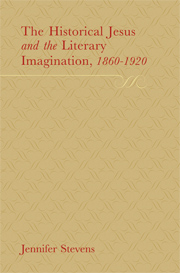Book contents
- Frontmatter
- Contents
- Acknowledgements
- Author's Note
- Introduction
- 1 The Victorians and the Bible
- 2 Nineteenth-Century Lives of Jesus
- 3 The Rise of the Fictional Jesus
- 4 The Fifth Gospel of Oscar Wilde
- 5 The Afterlife of Oscar Wilde's Oral Tales
- 6 A Peculiar Protestant: The Gospels According to George Moore
- 7 George Moore's Life of Jesus
- Conclusion
- Bibliography
- Index
3 - The Rise of the Fictional Jesus
- Frontmatter
- Contents
- Acknowledgements
- Author's Note
- Introduction
- 1 The Victorians and the Bible
- 2 Nineteenth-Century Lives of Jesus
- 3 The Rise of the Fictional Jesus
- 4 The Fifth Gospel of Oscar Wilde
- 5 The Afterlife of Oscar Wilde's Oral Tales
- 6 A Peculiar Protestant: The Gospels According to George Moore
- 7 George Moore's Life of Jesus
- Conclusion
- Bibliography
- Index
Summary
[The novel] is the most elastic, the most adaptable of forms. No one has a right to set limits to its range.
Mrs Humphry Ward, A Writer's RecollectionsIn a survey of British fiction published in 1859, David Masson reported that ‘Hardly a question or doctrine of the last ten years can be pointed out that has not had a novel framed in its interest, positively or negatively.’ It was an observation never more accurate than in the case of religious debates and controversies. By the middle decades of the nineteenth century, the rapid growth of the Lives of Jesus genre was more than matched by that of the religious novel. One of the first critics to survey the entire body of Victorian religious fiction, Margaret Maison, remarks that: ‘Its very abundance is […] a drawback, for the reader is presented with such an overwhelming embarras de richesse.’ Whether written from the standpoint of, say, the Broad Churchman, the Tractarian, the Evangelical or the atheist, religious novels responded, with varying degrees of directness, to the contemporary theological and scientific debates that threatened to overturn Christian orthodoxy. Furthermore, they allowed the layman to engage with religious controversies more usually confined to the clergyman or the academic, in a form of discourse hitherto associated with the secular and, to some minds, the profane.
Arguments concerning the morality and aesthetics of the religious novel were underway as early as the 1840s.
- Type
- Chapter
- Information
- The Historical Jesus and the Literary Imagination 1860-1920 , pp. 84 - 138Publisher: Liverpool University PressPrint publication year: 2010



